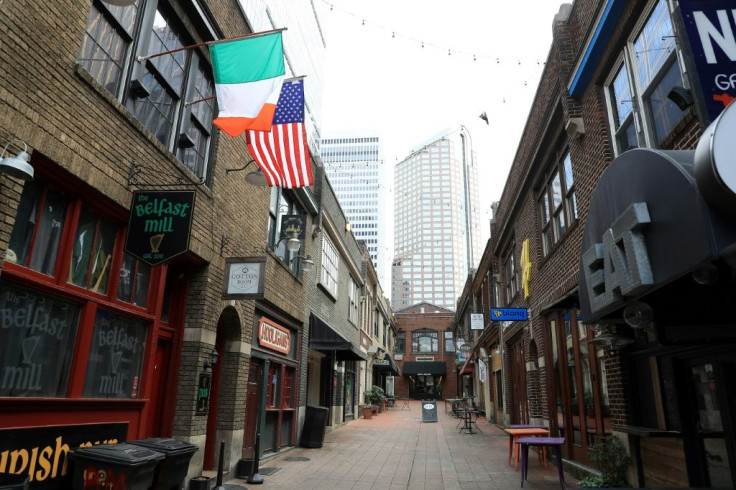Many US Small Businesses Facing Existential Threat If Coronavirus Pandemic Persists

KEY POINTS
- 75% of small businesses only have enough accessible cash to cover expenses for two months or less
- Small businesses comprise 48% of the U.S. workforce and 43.5% of GDP
- Restaurants are especially vulnerable to collapse
Many small business owners in the U.S. fear that if the economy does not reopen quickly, they will not survive the summer, much less the end of the year, due to the coronavirus pandemic and related shutdown.
A survey of small business owners conducted by economists at Harvard University, University of Illinois and University of Chicago, found that 75% only have enough accessible cash to cover expenses for two months or less. About 41.4% said they were temporarily closed, while their workforce had been slashed by an average of 40%.
“There’s a real fragility that small businesses have,” says Alex Bartik, assistant professor at the University of Illinois, and one of the survey’s co-authors. “Very few [small businesses] have the kind of cash on hand where they could keep their doors open for a sustained time period, given the current crisis.”
Small businesses, which have fewer than 500 employees as defined by the U.S. Small Business Administration, comprise nearly half (48%) of the U.S. workforce and 43.5% of gross domestic product.
Businesses in certain industries face a darker future than others.
For example, businesses involved in tourism and hospitality said they have a 66% chance of surviving through the end of 2020 if the crisis lasts only one month, while businesses like beauty salons and gyms said they have a 57% chance of surviving. (The responses varied by geography since states like Washington, New York, and California appeared to have been hit by the pandemic first).
If the crisis were to persist for four months, personal services business owners predicted they have a 48% chance of surviving to the end of the year. If it lasts six months, they foresee only a 27% chance of making it.
Restaurants – which by the very nature of its businesses relies on close contact with the public – are especially vulnerable to collapse. Owners here said they have a 30% chance of surviving a four-month pandemic; and only a 15% chance if it drags on for six months.
Bartik noted, however, that many small businesses have access to credit lines that can help tide them over. But most businesses “aren’t set up to have revenue go to zero for a sustained period of time,” he warned. As a result, some will likely file for bankruptcy.
While 72% of surveyed small businesses said they would apply for federal stimulus loans through the Paycheck Protection Program – such funds, totaling some $349 billion, had already dried up by Thursday.
“It’s a big deal, and not just for owners of businesses,” Bartik added. “Whether or not they can survive through this crisis will have a big effect on a lot of Americans’ ability to get back to work.”
On Tuesday, a survey by a group called Main Street America found that almost 7.5 million small businesses around the country may close permanently if the coronavirus pandemic continues for up to five months. Some 3.5 million small businesses could shut down permanently in just the next two months.
The survey also revealed that some 35.7 million American working at small firms are at risk of unemployment. (Some 22 million people have already filed for unemployment insurance over the past few weeks, though not all of them worked at small businesses).
“We remain deeply concerned that many of our nation’s smallest businesses are the most vulnerable to revenue disruption caused by the pandemic, and these businesses are the least able to obtain funds absent a well-developed relationship with an existing lender and/or technical assistance in securing funds,” said Patrice Frey, president and CEO of Main Street America.
Frey added that firms with 20 employees or less were particularly vulnerable.
“While these smaller firms are an essential part of the U.S. economy, they’re often financially fragile, with little cash on hand or resources to buffer even a minor financial shock,” wrote the Harvard Business Review. “In the throes of the sweeping disruptions caused by the coronavirus, businesses around the country have closed temporarily. Many have ongoing expenses and little or no revenue and face the prospect that they may never reopen.”
A survey by the National Federation of Independent Business, or NFIB, found that 76% of small businesses have already been negatively impacted by the pandemic.
“The magnitude of disruption now on the small business sector is profound,” said NFIB.
“What we’re hearing from our small business members is a real determination to come through this and, if at all possible, deliver essential goods and services to their customers safely," added Bill Herrle, NFIB’s state executive director in Florida.
© Copyright IBTimes 2025. All rights reserved.





















